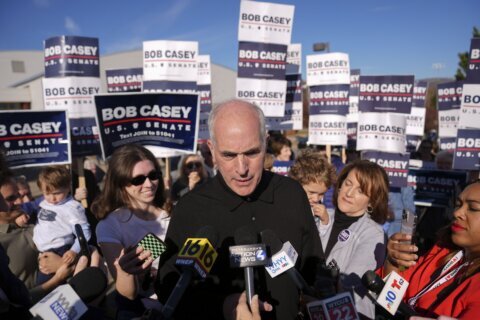NEW YORK (AP) — When you think of blockbusters, the first thing that comes to mind might not be a 215-minute postwar epic screening for the first time at Lincoln Center.
But that was the scene last week when the New York Film Festival hosted a 70mm print of Brady Corbet’s “The Brutalist.” The festival hadn’t then officially begun — its 62nd edition opens Friday — but the advance press screening drew long lines — as some attendees noted, not unlike those at Ellis Island in the film — and a packed Walter Reade Theatre.
Word had gotten around: “The Brutalist” is something to see. Corbet’s epic, starring Adrian Brody as a Jewish architect remaking his life in Pennsylvania, is the kind of colossal cinematic construction that doesn’t come around every day. Shot in VistaVision and structured like movements in a symphony (with a 15-minute intermission to boot), “The Brutalist” is indeed something to behold. It’s arthouse and blockbuster in one, and, maybe, a reminder of the movies’ capacity for uncompromising grandeur — and the awe that can inspire.
It’s been fashionable in recent years to wonder about the fate of the movies, but it can be hard to placate those concerns at the New York Film Festival. The festival prizes itself on gathering the best cinema from around the world. And this year, the movies are filled with bold forays of form and perspective that you can feel pushing film forward.
This is also the time Oscar campaigns begin lurching into gear, with Q&As and cocktail parties. But, unlike last year when “Oppenheimer” and “Barbie” were entrenched as favorites, the best picture race is said to be wide open. In that vacuum, movies like “The Brutalist” and the NYFF opener, RaMell Ross’ “Nickel Boys,” not to mention Sean Baker’s “Anora” and Jacques Audiard’s “Emilia Perez,” are poised to test arthouse boundaries. This year, those films might be the blockbusters to beat.
“Nickel Boys,” the opening night selection, is Ross’ fictional film debut, but it also carries over the exquisite eye he brought to his 2018 Oscar-nominated documentary “Hale County This Morning, This Evening.” Ross films the adaptation of Colson Whitehead’s novel from the subjective points of view of two boys — Ellwood (Ethan Herisse) and Turner (Brandon Wilson) — who are among the Black students abused at Nickel Academy, a Florida reform school. In a film sprinkled with brutality and tenderness, the first-person approach gives “Nickelboys” a radical sense of empathy.
The festival includes a number of sections and sidebars, but its main slate remains its core. This year, that’s 32 films from 24 countries, including “The Seed of the Sacred Fig,” by exiled Iranian director Mohammad Rasoul; “Caught by the Tides,” by Chinese filmmaker Jia Zhangke; and French director Mati Diop’s documentary “Dahomey.”
One of the standouts is Georgian director Dea Kulumbegashvili‘s devastating, despairing sophomore feature “April.” Like, “Nickelboys,” it, too, plays with perspective. An obstetrician, Nina (Ia Sukhitashvili), is blamed for the death of a newborn, but the subsequent investigation has more to do with the illegal abortions she performs in a small Georgian village beneath the Caucasus Mountains.
Kulumbegashvili’s follow-up to her debut, “Beginning,” is both bracingly real — she shot a live birth for the film — and mysteriously surreal. Occasionally we see from Nina’s perspective, other times we hover just outside it; sometimes “April” seems to visualize something inside her. The effect is chilling, as if Nina’s body is a moving target.
Like Ross, Indian filmmaker Payal Kapadia worked in documentary before turning to fiction with her luminous “All We Imagine as Light.” Despite being a prize-winner at Cannes, the film was surprisingly overlooked for India’s Oscar submission. But that shouldn’t detract from Kapadia’s remarkable accomplishment.
In it, three women (Kani Kusruti, Divya Prabha, Chhaya Kadam) juggle dreams and reality in modern Mumbai while working at a hospital. Midway, the film shifts from city to country, allowing them a new outlook on Mumbai and the class structures that govern their private lives. “All We Imagine as Light” begins with the gritty realism of a documentary but melts enchantingly into fable.
Like “All We Imagine as Light,” another main slate entry, Carson Lund’s “Eephus,” reaches its conclusion at sunset with the dying out of light. In Lund’s charming, wry hangout movie, a group of small-town middle-aged guys gather for a baseball game on a field that’s soon to be turned into something else. With the fewest of fans and the creakiest of knees, they play one last one. There’s laughter and storytelling but they’re also sliding like they mean it.
There’s an existentialist quality to “Eephus” that could make it a good parable for plenty of things, even the movies. But it’s a lovely reminder that, whomever is watching, you play for the love of the game.
___
This story has been updated to correct the first name of filmmaker Brady Corbet.
Copyright © 2024 The Associated Press. All rights reserved. This material may not be published, broadcast, written or redistributed.







